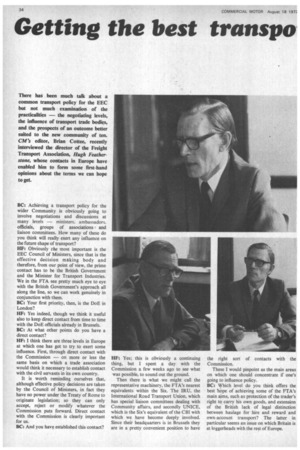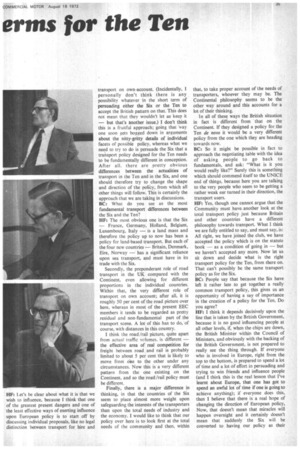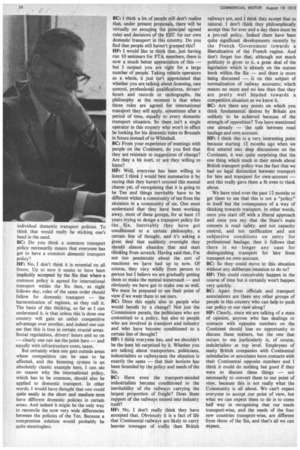Getting the best trans p 0
Page 36

Page 37

Page 38

If you've noticed an error in this article please click here to report it so we can fix it.
erms for the Ten
There has been much talk about a common transport policy for the EEC but not much examination of the practicalities — the negotiating levels, the influence of transport trade bodies, and the prospects of an outcome better suited to the new community of ten.
CM'S editor, Brian Cottee, recently interviewed the director of the Freight Transport Association, Hugh Featherstone, whose contacts in Europe have enabled him to form some first-hand opinions about the terms we can hope to get.
BC: Achieving a transport policy for the wider Community is obviously going to involve negotiations and discussions at many levels — ministers, ambassadors. officials, groups of associations and liaison committees. How many of these do you think will really exert any influence on the future shape of transport?
HF: Obviously the most important is the EEC Council of Ministers, since that is the effective decision making body and therefore, from our point of view, the prime contact has to be the British Government and the Minister for Transport Industries. We in the PTA see pretty much eye to eye with the British Government's approach all along the line, so we can work genuinely in conjunction with them.
BC: Your first priority, then, is the DoE in London?
HF: Yes indeed, though we think it useful also to keep direct contact from time to time with the DoE officials already in Brussels. BC: At what other points do you have a direct contact?
HF: I think there are three levels in Europe at which one has got to try to exert some influence. First, through direct contact with the Commission — on more or less the same basis on which a trade association would think it necessary to establish contact with the civil servants in its own country.
It is worth reminding ourselves that, although effective policy decisions are taken by the Council of Ministers, in fact they have no power under the Treaty of Rome to originate legislation; so they can only accept, reject or modify whatever the Commission puts forward. Direct contact with the Commission is clearly important for us.
BC: And you have established this contact?
HF: Yes; this is obviously a continuing thing, but I spent a day with the Commission a few weeks ago to see what was possible, to sound out the ground.
Then there is what we might call the representative machinery, the PTA's nearest equivalents within the Six. The IRU, the International Road Transport Union, which has special liaison committees dealing with Community affairs, and secondly UNICE, which is the Six's equivalent of the CBI with which we have become deeply involved. Since their headquarters is in Brussels they are in a pretty convenient position to have the right sort of contacts with the Commission.
These I would pinpoint as the main areas on which one should concentrate if one's going to influence policy.
BC: Which level do you think offers the best hope of achieving some of the FTA's main aims, such as protection of the trader's right to carry his own goods, and extension of the British lack of legal distinction between haulage for hire and reward and own-account transport? The latter in particular seems an issue on which Britain is at loggerheads with the rest of Europe. HF: Let's be clear about what it is that we wish to influence, because I think that one of the greatest present dangers and one of the least effective ways of exerting influence upon European policy is to start off by discussing individual proposals, like no legal distinction between transport for hire and transport on own-account. (Incidentally, I personally don't think there is any possibility whatever in the short term of persuading either the Six or the Ten to accept the British pattern on that. This does not mean that they wouldn't let us keep it — but that's another issue.) I don't think this is a fruitful approach; going that -way one soon gets bogged down in arguments about the nitty-gritty details of individual facets of possible policy, whereas what we need to try to do is persuade the Six that a transport policy designed for the Ten needs to be fundamentally different in conception. After all. there are pretty obvious differences between the actualities of transport in the Ten and in the Six, and one should therefore try to change the shape and direction of the policy, from which all other things will follow. This is certainly the approach that we are taking in discussions. BC: What do you see as the most fundamental transport differences between the Six and the Ten?
HF: The most obvious one is that the Six — France, Germany, Holland, Belgium, Luxembourg, Italy — is a land mass and therefore the policy up to now has been a policy for land-based transport. But each of the four new countries — Britain, Denmark, Eire, Norway has a significant reliance upon sea transport, and must have in its trade with the Six.
Secondly, the preponderant role of road transport in the UK compared with the Continent, even allowing for different proportions in the individual countries. Within that, the very different role of transport on own account; after all, it is roughly 50 per cent of the road picture over here, whereas in most of the present EEC members it tends to be regarded as pretty residual and non-fundamental part of the transport scene. A lot of this has to do, of course, with distances in this country.
I think the road/rail picture, quite apart from actual traffic volumes, is different — the effective area of real competition for freight between road and rail is probably limited to about 5 per cent that is likely to move from One to the other under any circumstances. Now this is a very different pattern from the one existing on the Continent, and so the road/rail policy must be different.
Finally, there is a major difference in thinking, in that the countries of the Six seem to place almost more weight upon safeguarding the interests of the transporters than upon the total needs of industry and the economy. I would like to think that our policy over here is to look first at the total needs of the community and then, within
that, to take proper account of the needs of transporters, whoever they may be. The Continental philosophy seems to be the other way around and this accounts for a lot of their thinking.
In all of these ways the British situation in fact is different from that on the Continent. If they designed a policy for the Ten de novo it would be a very different policy from the one which they are heading towards now.
BC: So it might be possible in fact to approach the negotiating table with the idea of asking people to go back to fundamentals, and ask: "What is it you would really like?" Surely this is something which should commend itself to the UNICE end of things, because here you are talking to the very people who seem to be getting a rather weak ear turned in their direction, the transport users.
HF: Yes, though one cannot argue that the Community must have another look at the total transport policy just because Britain and other countries have a different philosophy towards transport. What I think we are fully entitled to say, and must say, is: All right, we have joined the club, we have accepted the policy which is on the statute book — as a condition of going in — but we haven't accepted any more. Now let us sit down and decide what is the right transport policy for the Ten, from there on. That can't possibly be the same transport policy as for the Six.
BC: People say that because the Six have left it rather late to get together a really common transport policy, this gives us an opportunity of having a say of importance in the creation of a policy for the Ten. Do you agree?
HF: I think it depends decisively upon the line that is taken by the British Government, because it is no good influencing people at all other levels, if, when the chips are down, the British Minister within the Council of Ministers, and obviously with the backing of the British Government, is not prepared to really see the thing through. If everyone who is involved in Europe, right from the top to the bottom, is prepared to spend a lot of time and a lot of effort in persuading and trying to win friends and influence people (and I think this is the real lesson that I've learnt about Europe, that one has got to spend an awful lot of time if one is going to achieve anything); if everyone does this, then I believe that there is a real hope of changing the direction of European policy, Now, that doesn't mean that miracles will happen overnight and it certainly doesn't mean that suddenly the Six will be converted to having our policy as their individual domestic transport policies. To think that would really be sticking one's head in the sand.
BC: Do you think a common transport policy necessarily means that everyone has got to have a common domestic transport policy?
HF: No, I don't think it is essential on all fronts. Up to now it seems to have been implicitly accepted by the Six that where a common policy is agreed for international transport within the Six then, as night follows day, rules of the same order should follow for domestic transport — the harmonization of regimes, as they call it. The basis of this thinking, so far as I can understand it, is that unless this is done one country will gain an unfair competitive advantage over another, and indeed one can see that this is true in certain crucial areas. Social regulations, drivers' hours and so on — clearly one can see the point here — and equally with infrastructure costs, taxes.
But certainly when one gets outside areas where competition can be seen to be affected, and the licensing system is an absolutely classic example here, I can, see no reason why the international policy, which has to be common, should also be applied to domestic transport. In other words, I would have thought that one could quite easily in the short and medium term have different domestic policies in certain areas. And indeed it might be the only way to reconcile the now very wide differencies between the policies of the Ten. Because a compromise solution would probably be quite meaningless. BC: I think a lot of people still don't realize that, under Present proposals, there will be virtually no escaping the principal agreed rules and decisions of the EEC for our own domestic transport in this country. Do you find that people still haven't grasped this? HF: I would like to think that, just having run 10 seminars for FTA members, there is now a much better appreciation of this — but I suspect you are right for a large number of people: Taking vehicle operators as a whole, it just isn't appreciated that whether you are talking about licensing, rate control, professional qualifications, drivers' hours and records or tachographs, the philosophy at the moment is that when those rules are agreed for international transport they will apply, sometimes after a period of time, equally to every domestic transport situation. So there isn't a single operator in this country who won't in effect be looking for his domestic rules to Brussels in future instead of to Whitehall.
BC: From your experience of meetings with people on the Continent, do you find that they are resistant to suggestions of change? Are they a bit inert, or are they willing to listen?
HP: Well, everyone has been willing to listen! I think I would best summarize it by saying that they haven't crossed this mental chasm yet, of recognizing that it is going to be Ten and things inevitably have to be different within a community of ten from the situation in a community of six. One must understand that they have been 'working away, most of these groups, for at least 15 years trying to design a transport policy for the Six. Inevitably they have got conditioned to a certain philosophy, a certain line of thought, and it's asking a great deal that suddenly overnight they should almost abandon that and start thinking from scratch. Having said that, I'm not too pessimistic about the sort of reactions we have had up to now. Of course, they vary wildly from person to person but I believe we are gradually getting them to make the mental gomersault — and obviously we have got to make one as well. We must be prepared to see theit point of view if we want them to see ours.
BC: Does this apply also to people who would benefit by a change? Not just the Commission people, the politicians who are committed to a policy, but also to people who are involved in transPort and industry and who have become conditioned to a certain line of thought?
HF: I think everyone has, and we shouldn't be the least bit surprised by it. Whether you are talking about transporters, politicians, industrialists or railwaymen the situation is exactly the same — that their horizon has been bounded by the policy and needs of the Six.
BC: Have even the transport-minded industrialists become conditioned to the inevitability of the railways carrying the largest proportion of freight? Does State support of the railways extend into industry itself?
HF: No, I don't really think they have accepted that. Obviously it is a fact of life that Continental railways are likely to carry heavier tonnages of traffic than British
railways are, and I think they accept that as natural. I don't think they philosophically accept that for ever and a day there must be a Pro-rail policy, Indeed there have been quite significant developments recently by the French Government towards a liberalization of the French regime. And don't forget too that, although not much publicity is given to it, a great deal of the legislation which is already on the statute book within, the Six — and there is more being discussed — is on this subject of normalization of railway accounts; which means no more and no less than that they are pretty well headed towards a competitive situation as we know it.
BC: Are there any points on which you think fundamental desires by Britain are unlikely to be achieved because of the strength of opposition? You have mentioned one already — the split between road haulage, and own account.
HF: I think this is a very interesting point because starting 12 months ago when we first entered into deep discussions on the Continent, it was quite surprising that the one thing which stuck in their minds about British transport policy was the fact that we had no legal distinction between transport for hire and transport for own-account — and this really gave them a fit even to think about.
We have tried over the past 12 months to get them to see that this is not a "policy" in itself but the consequence of a way of thinking towards transport. In other words, once you start off with a liberal approach and once you say that the State's main concern is road safety. and not capacity control, and not tariffication and not subjective conditions on entry for professional haulage, then it follows that there is no longer any case for distinguishing transport for hire from transport on own-account.
BC: So they could move to this situation without any deliberate intention to do so? HF: This could conceivably happen in the course of time but it certainly won't happen very quickly.
BC: Apart from officials and transport associations are there any other groups of people in this country who can help to push our policy or our view along?
HF: Clearly, since we are talking of a state of opinion, ,anyone who has dealings or contacts with opposite numbers on the Continent should lose no opportunity to discuss these matters, but the one that occurs to me Particularly is, of course, induitrialists at top level. Employees of many British companies with Continental subsidiaries or associates have contacts with their Continental opposite numbers and I think it could do nothing but good if they were to discuss these things — not necessarily to convert them to our point of view, because this is not really what the Community is all about. We can't expect everyone to accept our point of view, but what we can expect them to do is to come half way in recognizing that our needs transport-wise, and the needs of the four new countries transport-wise, are different from those of the Six, and that's all we can expect.


































































































